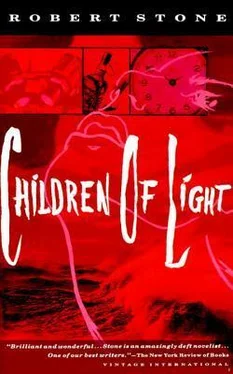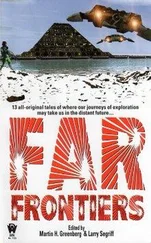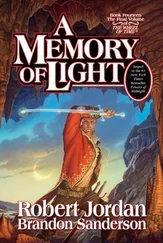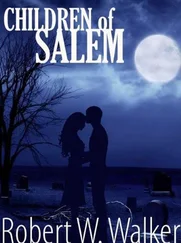Robert Stone - Children of Light
Здесь есть возможность читать онлайн «Robert Stone - Children of Light» весь текст электронной книги совершенно бесплатно (целиком полную версию без сокращений). В некоторых случаях можно слушать аудио, скачать через торрент в формате fb2 и присутствует краткое содержание. Год выпуска: 1992, Издательство: Vintage, Жанр: Современная проза, на английском языке. Описание произведения, (предисловие) а так же отзывы посетителей доступны на портале библиотеки ЛибКат.
- Название:Children of Light
- Автор:
- Издательство:Vintage
- Жанр:
- Год:1992
- ISBN:нет данных
- Рейтинг книги:4 / 5. Голосов: 1
-
Избранное:Добавить в избранное
- Отзывы:
-
Ваша оценка:
- 80
- 1
- 2
- 3
- 4
- 5
Children of Light: краткое содержание, описание и аннотация
Предлагаем к чтению аннотацию, описание, краткое содержание или предисловие (зависит от того, что написал сам автор книги «Children of Light»). Если вы не нашли необходимую информацию о книге — напишите в комментариях, мы постараемся отыскать её.
Children of Light — читать онлайн бесплатно полную книгу (весь текст) целиком
Ниже представлен текст книги, разбитый по страницам. Система сохранения места последней прочитанной страницы, позволяет с удобством читать онлайн бесплатно книгу «Children of Light», без необходимости каждый раз заново искать на чём Вы остановились. Поставьте закладку, и сможете в любой момент перейти на страницу, на которой закончили чтение.
Интервал:
Закладка:
“That was the James Mason ‘think I’ll do a few laps around Catalina between Old-Fashioneds’ one,” she called to Drogue as she went by.
As they set up for the sky and ocean shot, Drogue looked grim.
“Watch this,” he told his assistant. “We’re gonna have the Lu Anne Happy Hour.”
“Is that a bad sign?” Hueffer asked him.
“Fuckin’ right. But it’s the up side.”
She came out again for their last take of the day and repeated the scene. The bathing suit was tossed aside. Numb with self-recognition, Edna went to her death.
“Hey, Lee,” Hueffer asked her as she came out of the water, “what was that called?”
“That,” she told him, clutching the robe about her shoulders, “is called Lupe Velez Takes a Dunk.”
Hueffer broke up. Drogue, Blakely, even the operator chortled as they clung to their uneasy perches.
When Lu Anne had passed, the laughter froze on Drogue’s face. He looked at Blakely and shrugged.
“She’s funny,” he said.
It had been dark for over half an hour when Walker’s road began its snaking descent from high desert to the canyon floor. His headlights were focused on a wall of deepening green that seemed to spin before him; the indifferently banked road felt as though it were falling away beneath his tires, threatening to send him out of control. At last, to his relief, the road ran flat and straight. He kept to the center, wary of animals, riders, pedestrians — and in less than a mile he saw the hotel sign.
Its entrance was tree-lined; a fountain played in front of the foyer. Its buildings were of white stucco that glowed under decorative lamps. To Walker after his weary drive it seemed all compounded of inviting sounds, liquefactive shadow and soft light.
An attendant took his bags and at the desk he found himself expected. The room to which he was conducted was as tasteful as its elegant extravagance could bear, a showy red-and-black room that suggested Spanish melodrama, theatrical sex and violence. Carmen. He overtipped the bellman with a ten from his winning roll.
He felt anxious and weary. On a whim, he had come to a place where he was without friends to see a woman whom he had no business to see. There were no other motives of consequence behind his journey.
In the shower he hummed an old number:
You take Sally, I’ll take Sue.
Makes no difference what you do.
Cocaine.
The breeze that came through his open balcony window was fragrant with sage, jasmine, eucalyptus. At Santa Anita his winner had been called O.K. So Far.
Among his supplies he found a packet of cologne-soaked towels, part of a first-class flight kit issued him on a flight that someone else had paid for. Not the Shakespeare people; there was no first class with them. Television. He dressed and brought out his works. He was preparing a snort, thinking O.K. So Far, when there sounded a knock on his door. He put the drugs away and went and opened it.
His visitor was Jon Axelrod, the unit manager.
“Hey, Gordon. Our house is”—he gave his hand a flip—“you know?”
“Thank you, Jon. I’m glad to be here. May I offer you some blow?”
Axelrod took a chair.
“I have to tell you the unit has very strict rules regarding the use of drugs. We report narcotics to the police. Otherwise we can’t get insurance.”
Walker spread a few lines out on his mirror.
“Stop at Siriwai’s?” Axelrod asked.
“Mexico’s not Mexico without the doctor.”
“Did you tell him we all miss him?”
“He knows.”
Axelrod removed a crisp U.S. twenty from his wallet, rolled it and took a snort. He was a slightly built man with an ageless fey face. He regarded Walker from the corners of his eyes, which were blue and bright with fractured whimsy. Walker took a line for himself and they sat in reflective silence for a moment.
“Lu Anne is good,” Axelrod said. “What I seen. Not a whole lot. But good stuff.”
“How’s her head?”
“She seems cheerful.”
“I can’t imagine,” Walker said, “what you mean by that.”
“She’s working well. We’re watching her. See, her husband just took their kids off on a trip. We weren’t expecting that. We thought — the guy’s a shrink, he’s her shrink. We put them all up on the budget. Then he leaves.”
“Where is she now?”
Axelrod smiled.
“Take a guess.”
Lu Anne, Walker thought, would be either screwing in a Jacuzzi or in church.
“In church?”
“Pretty good, fella. She went to church in town. Billy Bly took her down.”
Walker was not too pleased to hear about Bly.
“Billy’s keeping an eye on her,” Axelrod told him. “We’re trying not to leave her alone too much.”
“How come he’s here? What do you call him on the budget?”
“Stunt coordinator. Hey, we made some changes in the shooting script, Gordon. We have a lot of falls.”
Walker was not amused.
“We got him down for special effects. He supervises the guys in the water, the guys with the horses. Lu Anne likes him.”
“They keeping company?”
Axelrod looked puzzled. “No,” he said. “I mean, her old man just left.”
“It’s a bad sign,” Walker said, “when she goes to church.”
They finished what was on the pocket mirror.
“How’s Walter?” Walker asked.
“Walter’s the same. What a talent, huh, Gordon?”
“Fuckin’ A. Will he be happy to see me?”
“Maybe he’s scared you might get to Lu Anne. Maybe not.”
Walker said nothing.
“You know Walter, Gordo. He doesn’t care if people like him. He thinks most people are wienies.”
“What does he think I came down here for?”
“He knows, Gordon. Everybody does.”
“Do they really?” Walker said. “Isn’t that something?”
“Wipe your nose good,” Axelrod said. “We should go see Charlie.”
The hotel restaurant had a terrace overlooking the bay. Adjoining it was a blue-tiled lounge with a service bar and a few candlelit tables. Two graying men sat at a table near the door. One was Charlie Freitag, esteemed gentleman producer. Charlie rose when Axelrod and Walker came in.
“Hello, Gordon,” Charlie called. He looked quite surprised. “How was your drive?” He turned to his companion. “This man drove down from L.A. He insisted!”
Walker was always happy to see Charlie Freitag, a pleasant, friendly man, possessed of a fatuous manner and many well-laid plans.
Charlie introduced the man he was drinking with as Howard Robinson. Robinson had the best suntan of anyone there; he wore checkered slacks and white loafers.
“Don’t care to fly?” he asked Walker.
“I like driving in Mexico,” Walker said.
“I could keep you in that for life,” Howard said, “if that’s what you like.”
Walker decided he represented Las Vegas investors, and it developed after a brief exchange that he did. He and Axelrod proved to be old acquaintances and Axelrod was the son of an IATSE enforcer from the days of the labor wars. There were always a lot of hoods around on Walter Drogue’s pictures and Walker had never determined the reason for it.
“Walter told me to greet you on his behalf,” Charlie said to Walker. “He bids you welcome.”
“Ah,” Walker said.
“You know who I think you should meet?” Charlie Freitag asked Walker. “You should meet Dongan Lowndes. Know his work?”
Walker knew it. It was a single novel of great force.
“I’m glad,” Freitag said. “He’s doing a piece on us for New York Arts. It can do us a lot of good where it counts.”
They went toward a dark corner where another party of two were sitting. Walker recognized one as Jack Best, the unit publicity man. Best hated him relentlessly over some drunken misadventure he could not recall.
Читать дальшеИнтервал:
Закладка:
Похожие книги на «Children of Light»
Представляем Вашему вниманию похожие книги на «Children of Light» списком для выбора. Мы отобрали схожую по названию и смыслу литературу в надежде предоставить читателям больше вариантов отыскать новые, интересные, ещё непрочитанные произведения.
Обсуждение, отзывы о книге «Children of Light» и просто собственные мнения читателей. Оставьте ваши комментарии, напишите, что Вы думаете о произведении, его смысле или главных героях. Укажите что конкретно понравилось, а что нет, и почему Вы так считаете.












